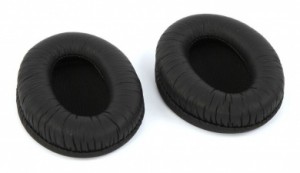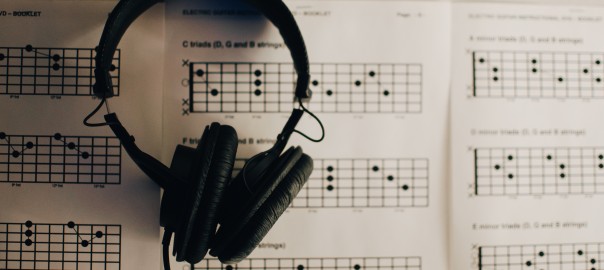The misconception: You make rational decisions based on the future value of objects, investments, and experiences.
The truth: Your decisions are tainted by the emotional investments you accumulate, and the more you invest in something, the harder it becomes to abandon it.–David McRaney
You Can Beat Your Brain
 About an hour ago someone I’d never met before knocked at my front door. I gave him a pair of headphones, he said thank you, and the transaction was done. I don’t imagine that we’ll ever meet again.
About an hour ago someone I’d never met before knocked at my front door. I gave him a pair of headphones, he said thank you, and the transaction was done. I don’t imagine that we’ll ever meet again.
We both benefited, me and the stranger: he gained a working pair of good quality hi-fi headphones, and I was rid of an object that I really didn’t need to own. This wasn’t as random an act as I’ve made it sound, and I haven’t started giving away everything I own in a fit of asceticism or altruism… it’s just that there are some possessions that I really don’t need to hang on to, and freecycle.org exists in order to rehome those things that I don’t have the energy or inclination to sell.
A familiar story?
Here’s the backstory: a long time ago—probably over ten years ago—I bought a pair of headphones. At the time I was spending a lot of time listening to music through some tiny in-the-ear earphones, and it seemed sensible to treat myself for my birthday or whatever to a reasonably good-quality pair of hi-fi headphones. So I did. The sound quality was great, but however I adjusted them they were never really very comfortable to wear and after a few weeks of trying I pretty much gave up using them.
Every now and then I’d rediscover these headphones, wherever I’d stashed them, and try them again and then realise why I’d stopped using them. It got to the point where I’d accidentally find them, glare at them because they reminded of how I’d invested a reasonable amount of money by purchasing them, then ignore them. One more thing that I owned, but never used any more. One more thing that I might as well not own, but could not get rid of because (once again) I’d been taken in by the so-called ‘sunk costs’ fallacy.
 Actually, about six months ago I re-discovered these headphones, found that the material on the ear pads had perished, and bought some replacement ear pads over the internet. Thus investing even more money in this thing that I owned, but never used. I thought I was being rational, after all – what good were the headphones if the pads were falling to bits? Buying new pads would make the headphones great again! But that was the fallacy at work. A more objective view would have been that I was ‘throwing good money after bad’, expressed very clearly as ‘the truth’ in the quote from David McRaney’s book at the top of this article.
Actually, about six months ago I re-discovered these headphones, found that the material on the ear pads had perished, and bought some replacement ear pads over the internet. Thus investing even more money in this thing that I owned, but never used. I thought I was being rational, after all – what good were the headphones if the pads were falling to bits? Buying new pads would make the headphones great again! But that was the fallacy at work. A more objective view would have been that I was ‘throwing good money after bad’, expressed very clearly as ‘the truth’ in the quote from David McRaney’s book at the top of this article.
Anyway, conditions have changed and I think I’ve now made a better decision by freecycling the headphones rather than putting them back in a box under my bed to be ignored for another six months. There’s always going to be the nagging concern in the back of my mind that I might just need those at some future point, and I’ll regret having got rid of them. But I’ve felt that often enough before, and I seem to have survived.
The ‘sunk costs’ fallacy
The headphones story is just one aspect of a greater springtime sort-out that I’ve been engaged in over the Easter holiday. And turning up unused item after unused item I’ve been realising that I’ve been reluctant to let go mainly due to the sunk costs fallacy. This fallacy is behind a huge range of dysfunctional human behaviour, from the relatively harmless (eating a whole bag of crisps, even though you’re not very hungry, because you paid for a whole bag of crisps) to the very harmful (a head of state starting a war against another nation, even though the war will not improve things under current conditions, because you had previously committed your country to that course of action based on the conditions back then).
 In economics a ‘sunk cost’ is a cost that has been put into a project, and that cannot be recovered. In psychology the same term, by analogy, applies to emotional investments that have already been made: things that we cannot forget or un-do. The fallacy part comes in when we assume that we’re operating rationally (by not allowing the sunk costs to disproportionately influence our decision making) while actually operating irrationally (because of the strong emotional investment we have already made).
In economics a ‘sunk cost’ is a cost that has been put into a project, and that cannot be recovered. In psychology the same term, by analogy, applies to emotional investments that have already been made: things that we cannot forget or un-do. The fallacy part comes in when we assume that we’re operating rationally (by not allowing the sunk costs to disproportionately influence our decision making) while actually operating irrationally (because of the strong emotional investment we have already made).
Apparently this fallacy is a consequence of the way that human minds work; the prospect of losses is a more powerful motivator on our behaviour than the promise of gains—which is also known as ‘loss aversion’—which means that we tend not to treat losses and gains in an even-handed way. In David McRaney’s highly readable book about cognitive biases and logical fallacies, ‘You can beat your brain‘ (US title: ‘You are now less dumb‘), he explains the enormous success of the Farmville game on social media in terms of the sunk costs fallacy. You can read this chapter of the book on McRaney’s own website (link).
Love people. Use things.
 Before I finish I’ll tell you about one more example from my springtime sort-out, one where the monetary value wasn’t a factor. And I’m not talking about the box of sixty leather bookmarks, although that was snapped up the same day by an enthusiastic freecycler whose mother apparently ‘loves all things books!’
Before I finish I’ll tell you about one more example from my springtime sort-out, one where the monetary value wasn’t a factor. And I’m not talking about the box of sixty leather bookmarks, although that was snapped up the same day by an enthusiastic freecycler whose mother apparently ‘loves all things books!’
For the past 25 years I’ve been hanging on to an A5-sized spiral-bound drawing pad, full of black pen landscape drawings that I’d done when I was about 15 years old. It was so long ago that I can’t quite remember what it was that made me start filling this book – I liked drawing and wanted to get better at it, I had time to spare during the school holidays. Anyway, the thing is that I’ve been hanging on to this pad for a quarter of a century: whenever I moved house, and that’s fairly often, the pad moved with me. I couldn’t get rid of this thing that was the only tangible reminder of the hundreds of hours I’d spent drawing these pictures in my mid-teens.
Looking through the pad of drawings a few days ago, with slightly more objective eyes, I realised that 90% of the drawings weren’t even original! I’d been working through a tutorial-style book called something like ‘How to draw landscapes‘. So I’ve removed the three pictures from the back of the pad that were my own creations, and recycled the rest. In fact I’ve gone one better and I’ve scanned these three pictures and they now live in ‘the cloud’ instead of my sock drawer.
 And it’s not even the pictures that have value for me, it is the meaning they hold for me and others, and this meaning doesn’t depend on the continued physical existence of the object. For example, one of the drawings was of the row of cottages where my grandparents lived for most of their lives (shown in the picture here). I know that my grandfather, in his 90s now, will find this fascinating, it’ll be something we can talk about. We can laugh together about the sheds where he accumulated about five duplicates of every kind of gardening tool – that was quite an effort when he eventually moved out and down-sized, to help him let go of 60 years worth of well-hoarded stuff.
And it’s not even the pictures that have value for me, it is the meaning they hold for me and others, and this meaning doesn’t depend on the continued physical existence of the object. For example, one of the drawings was of the row of cottages where my grandparents lived for most of their lives (shown in the picture here). I know that my grandfather, in his 90s now, will find this fascinating, it’ll be something we can talk about. We can laugh together about the sheds where he accumulated about five duplicates of every kind of gardening tool – that was quite an effort when he eventually moved out and down-sized, to help him let go of 60 years worth of well-hoarded stuff.
Let it go, let it go…
To conclude then, I’m not going to tell you that you might as well get rid of that material clutter in your life – you probably already know that! I’m not about to give you any advice about how to let go of the stuff that you’re needlessly hoarding either, there are enough minimalism blogs and progs which can help you with that. My point is this: remember the sunk costs fallacy, which lies behind your irrational reluctance to get rid of stuff that is of no value to you. And in remembering it, you’re no longer beholden to its underhand influence. If you can remember this with the more trivial issues of day-to-day living, there’s hope that you might also avoid the unethical actions that we are driven towards by loss aversion.
Looking to the near future, it will soon enough be time for the great summer sort-out, which means tackling the dreaded shed. Wish me luck.


So what has all this got to do with the middle way? The most obvious thing, which I’m taking from Robert’s book for beginners (Migglism), is that using critical thinking in this way can help to make us aware of metaphysical beliefs, and to overcome cognitive biases. By avoiding metaphysics we’re following the Middle Way, and hopefully making better decisions as a consequence.
Writing this blog post made me consider my situation from a more objective place, in the third person, by imagining how it might appear to a random reader. Things like ‘Oh, how kind this gentleman is, giving away his stuff to people who’d benefit more from it!’ or ‘What a disgusting display of holier-than-thou virtue signalling!’
From there I found myself considering (slow thinking) what my motivations really were for my decisions and action. For example, is my behaviour being driven by something that a third party wouldn’t necessarily notice very easily? Do I enjoy the feeling of control over my life that clearing out unneeded items gives me, the sense of purpose and a job well done?
The point I’ve arrived at is – as usual – the messy middle. My motivations may be a mixture of all of these things (being kind, virtue signalling, doing something that empowers me, etc.), but there isn’t a single simple reason behind it. As is often the way, I did what I did because it seemed like the right thing to do at the time, and then I’ve applied some post-hoc rationalisation, retrospectively attributing specific motives that seem coherent with my existing beliefs and thirst for meaning.
Jim, I do like your breezily engaging style, balanced by a degree of reflexive self-examination, as in this post and your following thoughts.
I do admit that my response to the post was initially irritable, in part because of the McCraney quote, which I found unpleasantly negative: how helpful can it be, for instance, to encourage possibly vulnerable others to adopt a combative stance re their brains? “Beat your brain before it succeeds in its mission to drive you out of your mind, sucker!”
Another aspect of your post got to me a bit, and it was the very personal possessiveness it implied, the idea that the main value or significance of the things you owned lay in your unique entitlement to them. Yours to own or give away, no questions asked. It occurred to me that, as a family man, your wife and/or children might rightly claim some title to the things their partner or father lay personal claim to: “All my worldly goods with thee I share” etc.
I admit freely that I’ve been party to this kind of unthinking selfishness myself. If that characterisation seems harsh, and if it gives you offence, I apologise. It’s offered in the spirit of migglist amity I share it with you.
My wife, who was born and raised in sub-Saharan Africa, never throws anything away, although she is at the same time immensely generous in every respect. She tells me that things have a value over and above their personal significance to the person who has stewardship over them. When I have claimed (to my shame) that I contribute ‘my income’ to the household account, she has often rebuked me for what she believes is a child-like, or at least an undeveloped, philosophy and attitude. I have come to see this is as a welcome truth, one that is helping me towards a more dignified and reliable maturity, although I often lapse.
I’m on the same journey as yourself, Jim, although we have different starting points and are merely (but blessedly) companion wayfarers by happy accident.
If I have anything useful to add to what I’ve already said above, it’s that it is imperative that we entrain and engage others, including those closest to us, in our quest for meaning and our floundering about ‘in the messy middle’. I’ve realised that I must balance the empowerment of the Middle Way philosophy and practice with the resources offered by my everyday life, its challenges to live as unselfishly as my deeply-entrenched conditioning allows, and its warts-and-all ineffability.
I do hope we shall meet some day, and I repeat that I enjoy your thoughts and ideas very much.
Peter 🙂
Hi Peter – I always enjoy reading your comments, they’re always honest, well worded and come from a very different perspective to my own.
No offense has been taken, and as you say none was intended. I know exactly what you mean about the unthinking selfishness in assuming that objects are wholly mine to do with as I see fit… I do try and include wife and son in any decisions about what might go (and often these are things that my wife really wants me to be shot of – the stinking collection of leather bookmarks for example. Or my large hoard of Thomas Hardy novels, which she does not like at all.). My wife has a different view on her ‘things’, and its not for me to muscle in and try to assert my beliefs about lightening the load.
Actually, every time I go into my son’s room I’m reminded about the near-absolutism of my belief that ‘stuff is bad’. It isn’t, but that’s my immediate reaction and the reasons behind it (if there are any) are many and complex. On the other hand, I was pleased last week to get rid of his old bike to someone else who could make good use of it – it had been loitering in the shed since Christmas when he got a ‘proper’ bike with gears, he’s way too big for it, and it would require a significant medical miracle for us to have any more children (who might ‘need’ this bike in the future).
Finally, David McRaney. This is something that I’ve become much more aware of recently, that books (or articles) get given shouty attention-grabbing titles that are not particularly representative of the tone or even the content of the book. Editors over-rule authors. Stephen Batchelor example: what he wanted to call ‘The Solar Buddha‘ (or something like that) was published as ‘After Buddhism‘.
McRaney’s first book was called “You are not so smart: why your memory is mostly fiction, why you have too many friends on facebook and 46 other ways you’re deluding yourself” which I think was the title of his blog about cognitive biases with a provocative sub-title appended. It’s semi-shouty, to my eyes. When the follow-up was published in the US it was given the title “You are now less dumb: how to conquer mob mentality, how to buy happiness all the other ways to outsmart yourself” (still fairly shouty, and using US vernacular), and that’s the title I first came across a number of years ago when teaching General Studies classes about ‘the scientific method’ (which is one of the ways in which humans have become ‘less dumb’ over the past few hundred years).
When the second book was published in the UK the title was changed not to “You are now less stupid” but to “You can beat your brain: “How to turn your enemies into friends, how to make better decision and other ways to be less dumb“. In fact, if I was foolish enough to judge a book by its cover then this one would not have made it out of the library (I reserved it online) – both the title and the jacket graphics are horrid. I’ve not photographed it order to spare you the trauma. The text in the book is superb, a very clear dissection of various cognitive biases, written in the best kind of casual informative popular science kind of way. There’s a MWS podcast with him too!
Keep the comments coming, they add considerable value to what I’ve done…
Jim
So, a week after publishing this I’ve come across an article discussing tidying up in terms of overcoming unhelpful cognitive biases…
https://www.theatlantic.com/business/archive/2015/05/an-economist-reads-marie-kondo/392921/
It is worth reading, especially as there are bits in there from the ‘undercover economist’ Tim Harford, whose book “Messy” I gave recently read and intend to review here later.